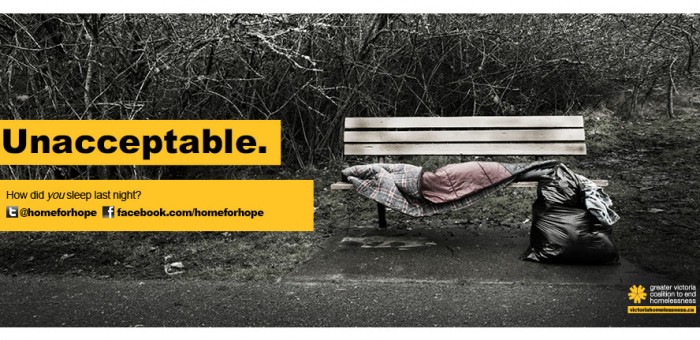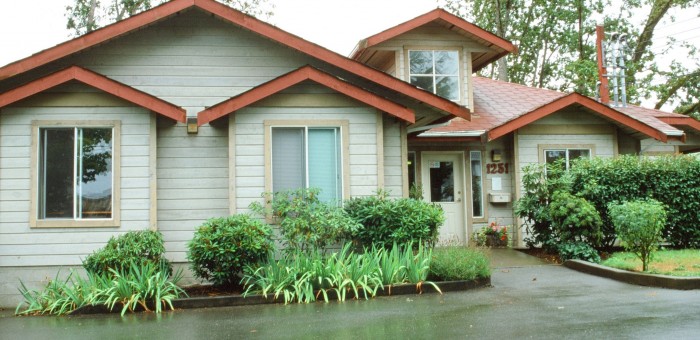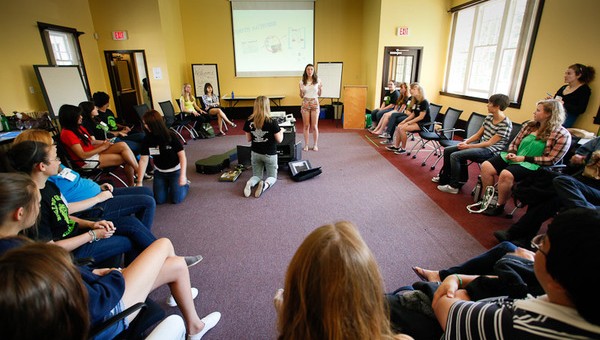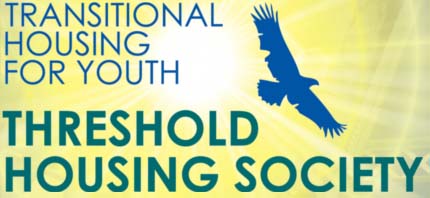Issues & Community Blog - Andrew Weaver: A Climate for Hope - Page 170
The Government’s Role in Ending Poverty and Homelessness
Over the last few weeks I’ve been highlighting the extent of poverty and homelessness in British Columbia and, in particular, Greater Victoria. It’s clear that significant work still needs to be done to address these issues. But it’s also important to recognize the good work that has and is taking place. Through new subsidized housing units, the provision of rent supplements and other programs, local groups, in partnership with the Province, have provided housing and prevented homelessness for many vulnerable people in Greater Victoria.
Despite these efforts, combating poverty and homelessness remains a struggle, not only in British Columbia, but also throughout Canada. We cannot solely rely on the work of non-profit organizations and charitable groups to resolve these issues — they need government leadership and help from all of us. And all levels of government must step up and provide the resources and support so desperately needed.
How did we get here?
In the 1960s and 1970s, amendments to the National Housing Act (NHA) launched a number of public housing and support programs that led to the creation of around 200,000 social housing units over a 10-year span. However, these programs were short-lived due to cutbacks in social housing and related programs beginning in the mid 1980s.
Today, annual national investment in housing has decreased by over 46% and current federal operating agreements are set to expire over the next 20 years, putting an additional 365,000 Canadian households at risk.
While there have been some new investments in recent years, including fairly substantial investments towards affordable housing in 2010 and 2006, they have been time-limited.
Overall, government action on poverty continues to fall short. Federally, Canada remains the only G8 country without a national housing strategy and provincially, British Columbia remains the only province that has not committed to developing a provincial poverty reduction plan. With 3 million Canadian households in need of affordable housing and BC having one of the highest poverty rates in the country, it is time for all levels of government to take real steps forward to end poverty and homelessness in our province.
Federal Role
In April 2014, the Canadian Government announced plans to renew the Homelessness Partnering Strategy (HPS), an approach to addressing homelessness by working in partnership with communities, provinces and territories, other federal departments and the private and not-for-profit sectors. With a commitment of nearly $600 million over five years and a new focus on using a Housing First approach, this is certainly a step in the right direction.
However, concerns over the short five-year time frame, the need for support and resources at a community level and Canada’s lack of affordable housing supply, leave many concerned about the ability of this plan to produce the results the government expects.
Similarly, in March 2014 the Governments of Canada and B.C. announced plans to extend the Investment in Affordable Housing (IAH) agreement. With each level of government committing to contribute $150 million over a five year period, IAH will support a range of housing needs for low-income individuals, families and seniors. Again, many doubt the ability of this investment to truly address the growing housing need in our province.
While strategies such as these help address some of the need, they are not enough. It is time for Canada to follow suit with all other G8 countries and develop a national plan or strategy to end homelessness.
Provincial Role
In response to BC’s homelessness crisis, the provincial government recently launched its Homelessness Prevention Program. This program expands rent supplements to four at-risk groups, helping individuals facing homelessness access rental housing in the private market. However, it does nothing to provide more affordable housing.
Instead, many argue that it is time for BC to adopt a comprehensive poverty reduction plan — one that would significantly reduce poverty and homelessness through legislated targets and timelines. The BC Poverty Reduction Coalition has been particularly active in this call, stating that BC needs a plan that addresses current issues with welfare rates and barriers, minimum wage, marginalized groups, affordable housing need, and access to childcare, education and healthcare.
This past fall, the Government of Saskatchewan announced their commitment to develop such a strategy, leaving British Columbia the only province without a plan to tackle poverty. With recent reports pointing out that BC has the highest rate of wealth inequality, a very high 16.4% overall poverty rate and one of the highest child poverty rates in the country, it is time for BC to join the rest of Canada and take comprehensive, long-term steps towards ending poverty and homelessness in our province.
Community Role
While effective action is still needed at the federal and provincial level, a number of communities across Canada have been making significant strides towards ending homelessness in their cities. Through the implementation of community plans, cities such as Lethbridge and Medicine Hat are well on target to end homelessness in their communities.
One of the champions of the recent community success has been the Canadian Alliance to End Homelessness. Through their document, “A Plan Not A Dream“, CAEH outlines the critical ingredients of a community-based plan and guides cities in the creation of their own local plans.
Here in Victoria, the Coalition’s 10-year goal to end homelessness is entering into its seventh year. The realization of their goals requires a community effort. Support from all levels of government, the private and not-for-profit sectors as well as local citizens is vital to their success.
Action Item
As an MLA, I have witnessed first-hand the impact that public opinion and engagement can have on encouraging the BC government to focus on a specific issue. Therefore, this week’s action item asks you to consider communicating to decision-makers the importance of making poverty and homelessness a priority. A good start might be to contact your local MLA and let them know that you would like British Columbia to adopt a comprehensive poverty reduction plan.
Please also consider urging your friends and family to write letters or emails to local Mayors, Councillors, MLAs and MPs, and the offices of the Premier and Prime Minister. Perhaps you might wish to rally broader community support by talking to your friends and relatives about poverty and homelessness. It’s time for us to take long-lasting, substantive steps towards ending poverty and homelessness in our Province.
Sharing Stories: Mustard Seed — Poverty and Food Insecurity
In our most recent post in our series on poverty and homelessness we asked people to consider sharing a story about their experiences. Sharing these stories serves as a reminder that poverty and homelessness are not a choice. It’s important for us to end the stigma and stereotypes that are too often associated with these issues. Each of us has followed a different path from the past to the present. Yet some of our paths have been rockier than others.
This week we are pleased to offer the third of these stories. We are grateful to The Mustard Seed for providing it to us. Entering into its 40th year of operation, the Mustard Seed is a non-profit organization providing many crucial services to those in need.
This post looks at the shift of non-profit food in Victoria, highlighting the connection between food provision and supportive programing, and the emergence of the Greater Victoria Food Share Network.
Food insecurity: The state of being without reliable access to sufficient quantity of affordable, nutritious and culturally appropriate food.
Food insecurity is one of several issues facing low-income communities in Greater Victoria, constituting one of the many facets of poverty that The Mustard Seed is working to eliminate. Through the creation of a micro food system within the organization through the production and distribution of food, followed by the composting of organic waste, The Mustard Seed does food banking well.
Our Drug and Alcohol Recovery Program at Hope Farm Healing Centre produces local, organic and fresh foods such as produce, eggs, and meat products that local businesses and non-profits purchase. Those in the program are supported in their recovery through the reconnection to land and to their food through farm work and the harvest season. Our food bank then distributes that fresh food along with all the other fresh and non-perishable foods we purchase or receive through amazing donations.
But it’s not enough to grow and distribute food when engaging with the all the complexity of poverty. The provision of food is not enough to say, find someone a place to live or help someone find suitable employment. Food helps, but it’s not enough. How do we do food banks differently in Victoria to engage positively with all the facets of poverty? How do we move away from that “Band-Aid” and emergency service, to food provision that also somehow helps someone find an affordable place to live? Or receive additional training or education to get a suitable job? How can we as food banks help those who come for support start making those positive steps out of the cycle of poverty and achieve food sovereignty?
Food banks were never set up to do this. They were a “stop-gap” with a sunset clause, meaning they were to close when food insecurity was solved. So far food insecurity persists. So as non-profits with mission statements about breaking the cycle of poverty we need to socially advocate for more government investment into long-term solutions like affordable housing, but also innovate on traditional ways of “doing” food banking to start reducing and eliminating poverty. Food banks can’t do this on their own and there is so much that needs to happen to achieve this, but here in Victoria something is shifting. Creative steps are being taken towards breaking the cycle, and to achieving food sovereignty. It’s happening through honest dialogue, collaboration, creativity and hard work.
The emerging of the Greater Victoria Food Share Network, a collaborative group of non-profits to which The Mustard Seed is a member, are moving away from traditional ways of “doing” food banks, steadily shifting away from the “emergency food” model, to one that connects food insecure individuals to their local neighborhood houses, community centres and non-profits, all of whom have supportive programing that food banks don’t. Further, food banks need to innovate better supportive programing on site addressing the root causes of poverty, like the Mustard Seed’s Family Centre focussed on skills training and capacity building for parents.
The connection of food provision and supportive programming, both going hand in hand, is transitioning from 7000-8000 people all heading down to the local food bank to line-up for food, to folks walking across the local park in their own neighborhood to collect an increasingly healthy and nutritious food hamper. Then they are provided with opportunities to participate in programs such as skills training, child care, employment programs and information on access to more affordable housing.
This is one of many collaborative initiatives of the Network and one small step towards a newly emerging way of “doing” food banks or perhaps more appropriately called “food access” in Greater Victoria. It’s not just about giving out food. It’s about the provision of healthy and nutritious food that creates connection. That creates opportunities. That’s done with dignity and respect. And most importantly that breaks the cycle of poverty. Because if we’re not doing that, then we’ll always have food banks. And who wants those?
Sharing Stories: Cridge Centre for the Family — A Story of Hope
In our most recent post in our series on poverty and homelessness we asked people to consider sharing a story about their experiences. Sharing these stories serves as a reminder that poverty and homelessness are not a choice. It’s important for us to end the stigma and stereotypes that are too often associated with these issues. Those who are homeless, just as those who are housed, should not be defined by where they live. Each of us has followed a different path from the past to the present. Yet some of our paths have been rockier than others.
This week we are pleased to offer the second these stories. We are grateful to The Cridge Centre for the Family for providing it to us. The Cridge Centre for the Family has been providing brain injury services for almost 25 years with a commitment to providing supportive housing for survivors of brain injury in Greater Victoria.
Recent studies have offered insight into a possible connection between brain injuries and homelessness, with 53% of the Toronto homeless population found to be living with a traumatic brain injury. The following is an impact story about how the Cridge services have helped a local man overcome the challenges of living with a brain injury.
Surviving a Brain Injury May Be Challenging but There is Hope
DF is 47 year-old male living with a brain injury. He was incarcerated on and off for a total of 14 years. DF’s life has been fraught with addiction issues and his crimes were in support of those addictions. His life was not easy and he makes no excuses for his past; however, he has remorse and regret. Every day he works a little bit harder to make amends and to do good in the community.
DF was homeless and living in a shelter for two years during his parole. In 2012, DF was accepted into Mary Cridge Manor (MCM). MCM is a program within the Brain Injury Services of the Cridge Centre for the Family. It is a housing program where clients live independently with supports. Although nervous, DF was excited for the opportunity to live in an apartment. He had not had a home in five years when he came to live at MCM. When DF moved in, he was so proud of his apartment and how it looked that he didn’t want to go out. He found great pleasure in staying home and knowing that he was safe and in an environment where he could finally thrive.
DF is completing his third year at MCM, which is the maximum time a person can be in the program. During this time, DF committed to developing life skills, interpersonal skills, leisure planning, vocation and addressing his addiction issues. It has not been an easy road but he certainly has tackled each step with courage and determination.
DF felt little hope until moving into this program. Not only is he preparing to move from MCM, he has returned to school and recertified in first-aid and trained in maintenance so he can now seek meaningful employment. He is excited about his future for the first time in many years, and so are we!
Celebrating youth in our community – Logan Graham
This is the fourteenth in our series of stories celebrating the outstanding accomplishments of youth in our community. These inspirational young adults are enriching our lives with their passion and commitment to the betterment of society.
Logan Graham
 Each year, 83 outstanding scholars from around the world are awarded a prestigious Rhodes Scholarship to attend Oxford University in the United Kingdom. Eleven of these students are from Canada and only one from the Province of British Columbia. Past Rhodes Scholars include former Prime Minister John Turner, former President Bill Clinton, former premiers Bob Rae (Ontario), Danny Williams (Newfoundland) and Allan Blakeney (Saskatchewan) as well as Andrew Wilkinson the MLA for Vancouver-Quilchena and Minister of Advanced Education. This year, Oak Bay High School graduate Logan Graham joins the Rhodes Scholars Elect class of 2015. In so doing, his name is added to a distinguished group of 108 previous British Columbia Rhodes Scholarship winners since 1904.
Each year, 83 outstanding scholars from around the world are awarded a prestigious Rhodes Scholarship to attend Oxford University in the United Kingdom. Eleven of these students are from Canada and only one from the Province of British Columbia. Past Rhodes Scholars include former Prime Minister John Turner, former President Bill Clinton, former premiers Bob Rae (Ontario), Danny Williams (Newfoundland) and Allan Blakeney (Saskatchewan) as well as Andrew Wilkinson the MLA for Vancouver-Quilchena and Minister of Advanced Education. This year, Oak Bay High School graduate Logan Graham joins the Rhodes Scholars Elect class of 2015. In so doing, his name is added to a distinguished group of 108 previous British Columbia Rhodes Scholarship winners since 1904.
 During our interview with Logan, it became obvious to us why he was awarded a 2015 Rhodes Scholarship. In just twenty years, Logan has accomplished more than many people achieve in a lifetime. And he’s done so while facing significant health challenges, having been diagnosed with rheumatoid arthritis at age 4 and suffering massive complications from the illness between ages 4 and 8 years.
During our interview with Logan, it became obvious to us why he was awarded a 2015 Rhodes Scholarship. In just twenty years, Logan has accomplished more than many people achieve in a lifetime. And he’s done so while facing significant health challenges, having been diagnosed with rheumatoid arthritis at age 4 and suffering massive complications from the illness between ages 4 and 8 years.
Logan is in his final year at UBC working towards an Honours Bachelor of Arts in Economics through funding from a UBC Major Entrance Scholarship for outstanding leadership, academics and entrepreneurship and the ConocoPhillips Centennial Scholarship administered by the Association of Universities and Colleges of Canada for young Canadian visionaries. But Logan’s family roots are here in our community. Remarkably, and coincidentally, I found out during our discussions that his uncle was James Graham (now a Fine Arts professor at the University of Lethbridge). James and I were good friends in high school and both graduated from Oak Bay in 1979. While some might argue that we are all only six degrees of separation from each other, in Victoria it’s more like one degree it seems!
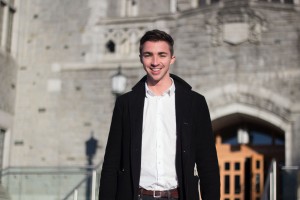 Prior to moving to Victoria with his family, Logan, who was born in Vancouver, attended West Point Grey Academy until Grade 7. At the tender age of seven, when most grade two children are focused on school, their friends and playing, Logan set out to form a foundation to advocate for children afflicted with rheumatic illnesses. That year Logan made a remarkable New Year’s resolution: “I’m going to hold a car wash and raise money for kids with arthritis”. The car wash raised $10,000 and since that first fundraising event, the Children’s Arthritis Foundation that Logan established with his parents and sister has raised over $160,000.
Prior to moving to Victoria with his family, Logan, who was born in Vancouver, attended West Point Grey Academy until Grade 7. At the tender age of seven, when most grade two children are focused on school, their friends and playing, Logan set out to form a foundation to advocate for children afflicted with rheumatic illnesses. That year Logan made a remarkable New Year’s resolution: “I’m going to hold a car wash and raise money for kids with arthritis”. The car wash raised $10,000 and since that first fundraising event, the Children’s Arthritis Foundation that Logan established with his parents and sister has raised over $160,000.
 To date, Logan, as Founder of the Children’s Arthritis Foundation has delivered presentations to over 5,000 people across Canada and the U.S., developed matching partnerships with donors and recruited several hundred students to help him run fundraisers. He’s done all of this because “kids with rheumatic illness have a really small say in the medical and political world that affects them. So over the past fourteen years, we’ve done things like provide the right shoes to kids for free, initiate the establishment of a research chair at UBC and train the next generation of health practitioners”. His motivation for starting the foundation came from a desire to help his friends – other children he had met with similar conditions.
To date, Logan, as Founder of the Children’s Arthritis Foundation has delivered presentations to over 5,000 people across Canada and the U.S., developed matching partnerships with donors and recruited several hundred students to help him run fundraisers. He’s done all of this because “kids with rheumatic illness have a really small say in the medical and political world that affects them. So over the past fourteen years, we’ve done things like provide the right shoes to kids for free, initiate the establishment of a research chair at UBC and train the next generation of health practitioners”. His motivation for starting the foundation came from a desire to help his friends – other children he had met with similar conditions.
When his family came to Victoria, Logan skipped grade 8 and went straight into grade 9 at Oak Bay High School. Not surprisingly, he excelled academically and was elected Valedictorian for his 2011 graduating class. During grade 9, he was part of the founding group of Oak Bay youth who worked with a municipal councilor whose goal was to make Oak Bay a youth-friendly place. He participated in the Leadership program at Oak Bay High and was on the Student Council. In 2010, he helped co-organize and lead an Oak Bay delegation and presentation to a Vancouver Island symposium on the recession.
 As President of the local Rotary Interact Club from 2010 to 2011, Logan worked to raise money in support of a project in Rwanda. He also coordinated a “Memory Café” through partnership with Oak Bay Lodge to hold youth-senior discussion sessions.
As President of the local Rotary Interact Club from 2010 to 2011, Logan worked to raise money in support of a project in Rwanda. He also coordinated a “Memory Café” through partnership with Oak Bay Lodge to hold youth-senior discussion sessions.
While in his last years at Oak Bay High School, Logan took up debating under the direction of Tim Bradshaw, an inspirational teacher who Logan described as the “sort of teacher where you look back and say he’s the one who opened up my eyes”. He excelled in debating and participated in several competitions including Oak Bay High’s annual Golden Gnome debate tournament, Model UN sessions, and a BC Commonwealth Debate competition hostedat St. Michaels University School.
Logan’s interest in financial economics, which ultimately took him to UBC, were nurtured and inspired by Chad Jacques, a teacher at Oak Bay. He recalls his teacher walking into business class one day and asking, “Do you know what today is”. Nobody responded. “Today is the start of a recession,” proclaimed Chad Jacques. For Logan, these words were motivating. He couldn’t believe that society could mess things up so badly; Logan went off to the library to start pouring through economics books.
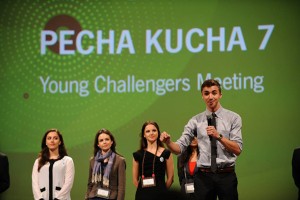 In grade 10 Chad Jacques also wrote a letter in support of Logan’s desire to attend a month long summer program at Oxford University in International Economics. Despite the prohibitive cost to register, Logan was determined to go. So during the course of the year he used his entrepreneurial skills to set up an estate management and home care company that allowed him to subsequently earn the $10,000 required. Clients were easy for him to come by, as his compelling story about wanting to attend the program at Oxford University was a door opener.
In grade 10 Chad Jacques also wrote a letter in support of Logan’s desire to attend a month long summer program at Oxford University in International Economics. Despite the prohibitive cost to register, Logan was determined to go. So during the course of the year he used his entrepreneurial skills to set up an estate management and home care company that allowed him to subsequently earn the $10,000 required. Clients were easy for him to come by, as his compelling story about wanting to attend the program at Oxford University was a door opener.
Ever since Logan was ten years old, he knew that Oxford was “a place I want to end up”. During a family vacation “his eyes lit up” at the magnificence and splendor of Oxford’s collegiate architecture. And sure enough, in 2015 Logan will fulfill his dream as he starts an MPhil in Economics.
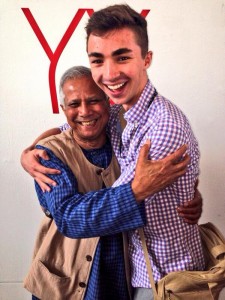 Having grown up in an entrepreneurial family environment, Logan knows what it means to take risks, show leadership and develop a strategy to reach one’s goals. In his first year at UBC, he founded the UBC Social Enterprise Club, as a place for student to apply “business techniques to real-life situations in order to solve social issues”. His passion for social enterprise together with his recognition of the need to facilitate ways for students to become involved in innovative business ventures that have significant social impact, has ensured the club has been a huge success. Through the club, hundreds of students and high-profile social impact professionals have come together to help bring ideas into reality. The club has created three employment opportunities by establishing Canada’s first student social venture consultancy and consulting with nine fast-growth local social ventures.
Having grown up in an entrepreneurial family environment, Logan knows what it means to take risks, show leadership and develop a strategy to reach one’s goals. In his first year at UBC, he founded the UBC Social Enterprise Club, as a place for student to apply “business techniques to real-life situations in order to solve social issues”. His passion for social enterprise together with his recognition of the need to facilitate ways for students to become involved in innovative business ventures that have significant social impact, has ensured the club has been a huge success. Through the club, hundreds of students and high-profile social impact professionals have come together to help bring ideas into reality. The club has created three employment opportunities by establishing Canada’s first student social venture consultancy and consulting with nine fast-growth local social ventures.
Last year, while attending the Global Social Business Summit in Kuala Lumpur, Malaysia Logan had the good fortune to meet 2006 Nobel Peace Prize winner Muhammad Yunus, founder of the Grameen Bank (known as the Bank of the Poor) and the concept of microfinancing in Bangladesh during the 1970s. Inspired by this workshop that was designed to bring young social entrepreneurs together with established more seasoned world leaders, Logan, along with three of his peers, launched another organization called: Yunus & Youth. This online platform connects young entrepreneurs and pairs them with world-renowned mentors, trains them with these experts and connects them with a global support network.
 Logan has a strong desire to continue to travel the world. After an exchange to the National University of Singapore in 2013 he had the opportunity to backpack around parts of China and was fascinated by what he witnessed. Logan commented to us on how China’s remarkable economic growth in recent years can be viewed as the world’s “single best poverty reduction program”. Sometime in the future Logan see himself spending time working in China, perhaps Guangzhou, a city he found to be most welcoming and exhilarating.
Logan has a strong desire to continue to travel the world. After an exchange to the National University of Singapore in 2013 he had the opportunity to backpack around parts of China and was fascinated by what he witnessed. Logan commented to us on how China’s remarkable economic growth in recent years can be viewed as the world’s “single best poverty reduction program”. Sometime in the future Logan see himself spending time working in China, perhaps Guangzhou, a city he found to be most welcoming and exhilarating.
An article from the UBC Vancouver School of Economics aptly notes that Logan is “an entrepreneur with a passion for using the principles of economics to solve social problems”. Whether at school, in business, or DJing under the catchy handle “Logarhythm”, Logan excels in all that he does. Yet family, and in particular his sister, are incredibly important to Logan. They struggled together as Logan battled rheumatoid arthritis at an early age. Logan is never short of praise for his family. He described his sister Tookie as “the smartest most caring person I know” and on social media when letting his friends know about his award he started off by saying: “Before anything else, I want to say that my biggest mentor, educator and inspiration has always been my sister Tookie Graham. From the moment you first tried to drag me through the bars of my crib, you have always been trying to show me the world.”
Logan views the Rhodes Scholarship as “a free path to learn about anything and then challenge everything”. I’m sure he had no idea how inspiring it was for me to hear him describe his academic aspirations in such terms. Whether it is poverty and homelessness, global population growth and sustainable development, climate change and water availability, or sustaining global biodiversity, the world’s greatest challenges require creative approaches in developing innovative solutions. We need visionaries in today’s youth to emerge as our political leaders of tomorrow. And it is our job, as the decisison-makers of today, to remove the barriers that otherwise would limit these social entrepreneurs from succeeding. Thank you Logan for all that you do.
Sharing Stories: Threshold Housing Society — Mitchell House 2014
In our most recent post in our series on poverty and homelessness we asked people to consider sharing a story about their experiences. Sharing these stories serves as a reminder that poverty and homelessness are not a choice. It’s important for us to end the stigma and stereotypes that are too often associated with these issues. Those who are homeless, just as those who are housed, should not be defined by where they live. Each of us has followed a different path from the past to the present. Yet some of our paths have been rockier than others.
This week we are pleased to offer the first of these stories. We are grateful to the Threshold Housing Society for providing it to us . The Threshold Housing Society provides transitional housing to youth at risk of becoming homeless.
Threshold Housing Society: Mitchell House 2014
By: Graham Kelly – House Supervisor
It was the night before Christmas, and all through the Scots Motel, many creatures were stirring: not only the mice. Skinny teenager Miles Winter was stirring also, or rather tossing and turning sleeplessly. The motel’s roaches were the worst when you felt them on your face, but at least they were silent. It was the scurrying sound of the mice that actually kept Miles awake, even on Christmas Eve, when everyone was supposed to be in a deep sleep dreaming of all they’d be waking up to. Miles knew there wouldn’t be much to wake up to in a few restless hours, when the sound of the motel alarm clock would go off like every morning, and his dad would plug in their tiny plastic tree and say “Merry Christmas kiddo.” It would not be his best, nor would it be his worst Christmas — so long as it was just the scuffling sound inside the walls, and not the rising sound of fighting through them, or the approaching sound of sirens after that. Lying uncomfortably in a pull-out cot, Miles thought of his little cousins a city away, who would wonder how Santa could get down into a motel room without a chimney, and where you would hang stockings when there was no fireplace – only an old, dead heater.
As he finally drifted off to sleep he hoped his cousins were having a Christmas like the one good one Miles had ever known, the one time the family was together and he got the toy he wanted. And he hoped his own Christmases would get better, be happier, and be in a nice house instead of an old motel.
**** **** ****
But the following Christmas, things looked no better for Miles. He and his dad had fled the infestation of that motel and moved on to another, staying as long as it took for his dad to be accepted into low income housing. The place his dad moved into did not have room for Miles, and he was forced to sleep on friends’ couches, until the welcomes finally wore out. He thought he might have to brave the cold and set up a borrowed tent in the park, spending Christmas outside, all alone. But exactly one week before Christmas Eve last year, everything changed. Miles was accepted on an emergency basis into
Mitchell House, the home for young men that I run. On the night of our Christmas dinner last year, Miles arrived to meet other residents and members of the Threshold Housing ‘family’. He was cold and thin, but excited to start a new life with us – well, right after eating a plate piled high with turkey and stuffing.
**** **** ****
This week, Miles and I went Christmas shopping together. We went straight to the toy aisle, where for a moment Miles seemed to become a child again, challenging me to a duel with a telescoping light sabres.
I noticed how much he has grown in a year, how much stronger he is after learning to cook for himself, and how physically fit he is from his job prepping food for sports events. I see the new clarity in his eyes, the focus and motivation he has gained, as he moves closer to his dream of becoming a chef. I see a strong, gifted, caring young man who has survived and thrived after being given a foundation to build on, and who now wishes to give back. And as he picks out toys to give his young cousins on Christmas morning, I see a young man who will never go back, and will make the world better as he goes forward.
– For every youth like Miles that is accepted, Threshold Housing has to turn away four more –

